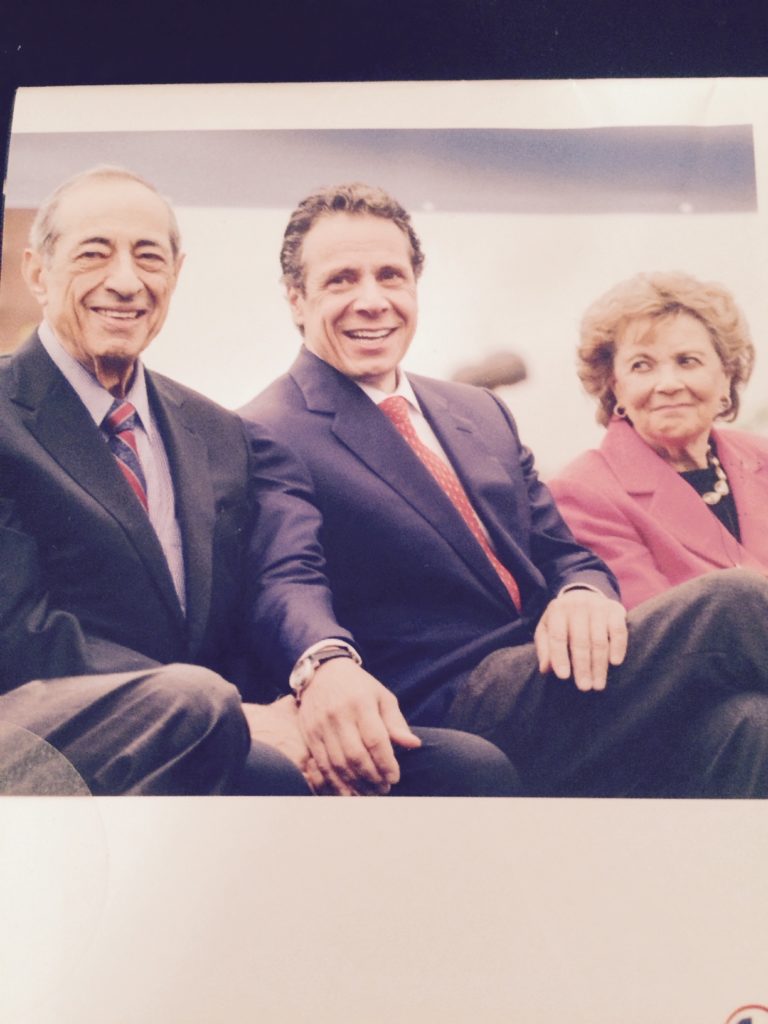
James Larocca, a former colleague from the first Administration of Governor Mario M. Cuomo of New York in the mid-1980’s, writing in the Long Island newspaper, Newsday (March 26, 2020), questioned whether the Democratic National Committee could nominate Andrew Cuomo for President this year.
Larocca, a former State Transportation Commission, candidate for Governor himself, and current Village Trustee in the Suffolk County village of Sag Harbor, made a straightforward case for Cuomo, contrasting the New York governor’s leadership against the utter failure of Donald Trump, and the lack of command of the crisis coming from either Joe Biden or Bernie Sanders:
“Contrast this with Cuomo’s management of the coronavirus emergency in New York. He has been clear-headed and clear-voiced, and that has been comforting. As a result, New Yorkers and their families understand what they must do to survive. And the governor is out there managing the state’s response, relentlessly foraging for critical medical supplies and equipment, and pushing the Trump administration and the federal bureaucracy to make better decisions.
Can the Democratic Party nominate a candidate in its convention other than one who has come through the primary process? No one apparently knows for sure. But if a nominee is not chosen on a first ballot at the convention, primary-chosen delegates can be released and the convention can open up to other candidates.”
The answer to the procedural question raised by Jim Larocca is a resounding, YES!
If Democrats want to win the war vs. the continuing Corona Virus both immediately and in the long-term, we should be pushing for the first deadlocked — or contested — Democratic National Convention since 1952. While Joe Biden has a sizeable lead in elected delegates as of today, with the majority of delegates yet to be decided in a peculiar primary year, nothing is a foregone conclusion. Biden has a 300+ delegate lead over Sanders — 1,215 over 910 — but is still some 776 delegates short of clinching the nomination.
Nate Silver’s 538 is projecting that if all of the remaining primaries are held between now and early June — a big “IF” — considering the accelerating pace of the Corona Virus around the nation and ESPECIALLY in New York, where the Democratic Presidential Primary was scheduled for April 28, 2020 — Biden is on track to win more than the 1,991 Delegates needed for nomination. But those political calculations may become moot, if the apocalyptic progress of the pandemic ends the primary season NOW, and puts the decision in the hands of the Democratic National Committee.
There is no historical precedent for what we find ourselves experiencing at this very moment. It may come down to an appeal by Democratic leaders, including former President Obama, to either Joe Biden, to release his delegates in favor of Andrew Cuomo, or to the 766 Super Delegates (Members of Congress, Governors) to back Biden, and put him over the top. It’s hard to see Democratic public officials — up for re-election — flocking to support Biden — who only appeared from his basement once via television during the COVID-19 crisis — when they’ve seen what a powerful difference a compelling candidate like Cuomo can make.
Alternatively, DNC leadership could declare the primary process complete, and immediately plan for an electronic or by-mail first ballot vote in July, allowing States which have not yet decided, to hold their primaries by mail-vote, or simply permit the State Party organizations to select who will represent their State at an in-person, or virtual, national convention. Some of these changes may require emergency State legislation.
The only example Democrats can look back to for a small measure of instruction is the 1952 Democratic National Convention in Chicago, when State Party organization’s did choose their national delegates. That was the last time any major party convention went past the first ballot to select a nominee. One dramatic change between that Convention 68 years ago, and today, has made a contested convention more likely. In 2018, Democrats, for the first time in modern history, passed a rule change preventing 766 so-called “super-delegates,” — DNC Members, Members of Congress, Senators and Governors, and “distinguished party members like ex-Presidents or Vice-Presidents — from casting their votes on the first ballot. This change alone could guarantee that no candidate will have enough delegates to win the Democratic Nomination on the first ballot.
Despite having Harry Truman as an incumbent President, Democrats entered the 1952 election cycle deeply divided with Truman supported by only 36% of Democrats nationwide, according to a Gallup Poll. In the first-in-the-nation New Hampshire Democratic Primary in February, 1952, Truman was toppled by semi-progressive Tennessee Senator Estes Kefauver, who was then conducting televised Senate investigations into organized crime, and surfing a wave of public support.
Just as Lyndon B. Johnson would do 16 years later, Truman interpreted his weak New Hampshire primary showing as a message to not seek re-election. With Truman out, Kefauver became the front-runner for the Democratic Presidential nomination, and he was locked in a tough battle with Senator Richard Russell of Georgia, a staunch segregationist, and the liberal Averell Harriman of New York, who served as President Truman’s Secretary of Commerce, and later became Governor of New York. No one arrived at the Democratic National Convention in Chicago that year with anywhere near the 616 delegates needed to win the nomination.
The Convention opened with a welcoming speech by the Governor of Illinois, Adlai E. Stevenson II, whose grandfather by the same name served as Vice President under President Grover Cleveland. Young Adlai’s speech was so well received, it began a boomlet for him to seek the nomination — something he had steadfastly resisted until that moment. Truman, who fought hard to integrate the Armed Services forcing segregationists like Strom Thurmond into their own Dixiecrat Party in 1948, was adamantly opposed to having an anti-integrationist like Russell as the Party’s standard bearer. President Truman threw his backing behind Stevenson, persuading Averell Harriman to pledge his 121 delegates to the Illinois Governor after the second ballot. With strong support from Harriman and Truman, Stevenson stormed past the two Southern Senators on the Convention’s third ballot, tallying 617 votes to the combined total of 540 for Kefauver and Russell.
While the political circumstances in 2020 are far different than those in 1952, the mechanics could work in a similar fashion, if Democratic party officials determine that because of the pandemic-shortened primary season, they need to have open balloting to pick the party’s Presidential candidate.
If Biden goes into the first ballot with his 1,215 committed delegates, Sanders with his 915, and Bloomberg, Warren, Buttigieg and Klobuchar with their approximate total of 130 delegates, that would set up a second ballot showdown — when not only are all committed delegates free to vote their conscience, but the 766 Super Delegates — elected officials — are unleashed to vote for the candidate of their choice.
With some 1,900+ delegates needed for a first ballot victory, it’s possible that no single candidate will have enough to win. Enter Andrew Cuomo.
A fresh, new Democratic ticket — a result of a consensus, led, most likely by Nancy Pelosi who would hold sway over some 230 Congressional Democrats with an acute interest in who will head the Democratic ticket, could play a powerful role in deciding who will head the ticket that could determine control of Congress. Based upon his outstanding leadership in dealing with the COVID-19 crisis in New York, it’s easy to foresee someone — especially from the New York State delegation — putting Andrew Cuomo’s name in nomination.
Conceivably, it could take a second, third or even fourth ballot for one candidate to aggregate enough support to win the nomination, the way Adlai Stevenson did after three ballots in 1952, but it’s highly likely that if Cuomo were drafted to be nominated, after the first ballot, he would win the Democratic Nomination by acclamation.
Cuomo has clearly demonstrated that even from his position of Governor of New York, history has its eyes on him to become the wartime president this pandemic-pummeled nation is demanding.
Not even the Democratic Party could resist that call.


